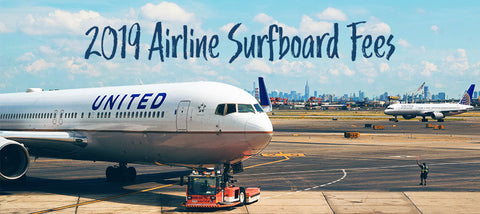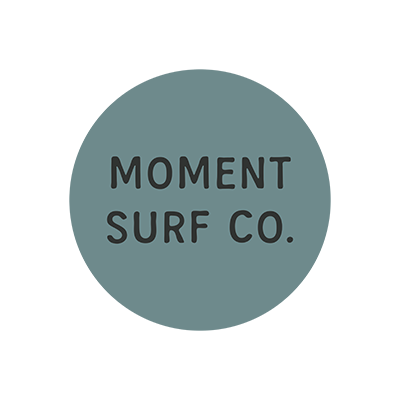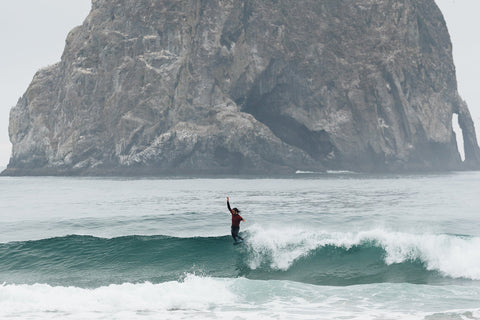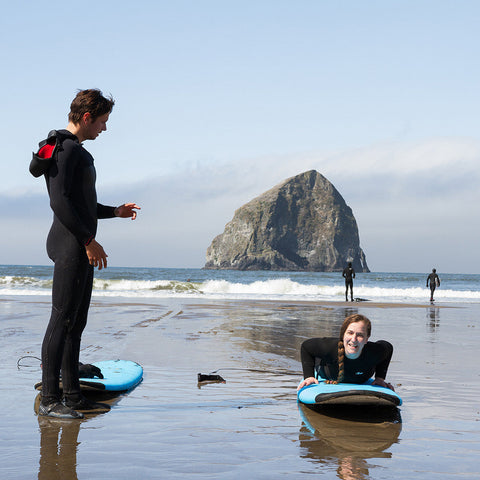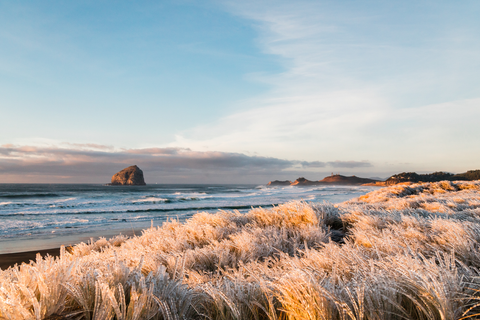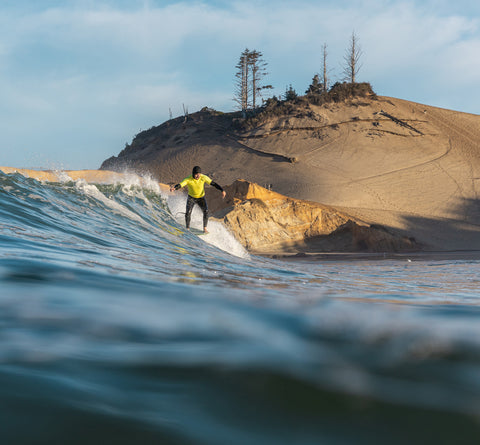*Update: If you want to see our 2020 updated list, please click here!
If you've followed us at all, you know we love to travel. However something we don't love is having to shell over a bunch of our hard earned cash just to bring our magic board along with us. That's why we've done our research, and compiled an in depth list of surfboard board bag fees from all the major airlines, and a bunch of smaller ones you still may end up using if you travel enough. While this list is as accurate as what the respective airlines websites are, it's still always best to call your airline ahead of time to double check so you don't get hit with any unexpected fees. Enjoy!

Full List
Aer Lingus - Free on transatlantic flights as part of your baggage allowance. Within Europe, $40 Euros when paid online, $50 Euros when paid at the airport. No longer than 9 Feet.
Aero Mexico - $75 within Mexico, $150 for international flights. 6’6” Max length for narrow body flights, 9’6” for wide body flights.
Air Asia - , bag weight, and whether you pay online or at check in. If you fly to or from Australia, your board flys free. These guys don’t depart out of the US, but if you’re buying a cheaper ticket to Indo or elsewhere in that region, you may be starting your trip home with them, which means you will be paying their fee’s.
Air Canada - $100 per board for each way of travel on round trip and multi-segment flights. Max length is 9’6”
Air China - Anywhere from $400 - $800 depending on weight. Basically, don’t fly Air China if you don’t absolutely have to.
Air France - $75 - $150 depending on where you depart from. If you’re flying within Europe, you board should count as your one free bag as long as you don’t check anything else.
Air New Zealand - Under 6’6” and 50 Ibs, your boards fly free. Over that and you’re looking at $150 or even more (ask our team rider Tony Perez how much a heavy bag can set you back).
Air Tahiti Nui - Free of charge as long as it’s less than 50 Ibs and under 8’2”. Otherwise it’s $80 if you are checking multiple bags, or $120 if it’s over 50 Ibs.
Alaska Airlines - $30 fee for boardbags under 50 Ibs, unless you are an Alaska Visa Signature Card holder and then your boards fly free as your first checked bag. If it’s over 50 Ibs, then it’s $100.
American Airlines - $150 regardless of the number of checked bags. Multiple boards less than 70 Ibs in one bag are considered one board. Max length is 10’6”, max weight is 70 Ibs. Brazil flights are $42.50 for the first board and $85 for additional.
ANA - Free as part of your allowed check in baggage, must be under 9’5”.
Avianca - Free as long as it’s part of your allowed baggage limits. Otherwise it’s gonna cost over $200. Allowed maximum 3 boards per bag, with a max weight of 70 Ibs and no longer than 12 feet.
Bahamasair - Treated as a checked bag (1st bag: free, 2nd bag: $35, 3rd bag: $75 for domestic). One board per bag. Must be under 50 lbs. Int. flights, bags 51-70 lbs: $75; bags 71-99 lbs: $125; and bags over 62" and 70 lbs are $150.
British Airways - Can be treated as your free checked bag as long as it’s under 6’3” and weighs less than 51 Ibs. Must be packed in a recognizable surfboard bag. From 51 - 70 Ibs it’ll cost you $100, anything over 70 Ibs will not be accepted.
Cathay Pacific - Varies depending on destination ranging from free to extremely expensive. If you have a longboard, this is probably not the airline for you. We did have a couple team riders report good experiences with them to and from Bali going through Hong Kong. We recommend calling the airline to sort it out before booking.
China Air - Varies with route, fees range from $115 - $200. One board per person. Call the airline ahead of booking.
China Eastern - Varies with route, and they charge per board. Some routes receive a 50% discount of first board fee, some don’t. Call the airline before booking.
Condor - Depending on the zone, either $115 or $150 if you book in advance. At the airport, it’s $145 or $160. Cannot be longer than 9’10” and no more than 66 Ibs.
COPA - $150 for all destinations. Two boards per bag, must be less than 100 Ibs and no longer than 9’6”. It is recommended that you call the airline ahead of time and let them know you will be bringing a surfboard, as they do have a limit to the number of cases allowed per flight.
Delta Airlines - $150 per boardbag, 2 boards allowed per bag. Must be under 70 Ibs or additional charges will apply. If flying between Honolulu and Maui, the fee is $20.
Lion Air - Roughly $15-20 depending on the exchange rate. It’s recommended that you call in advance.
Easyjet - Approximately $61 paid in advance, or $74 at the airport with a max weight of 70 Ibs. One board per passenger.
Emirates - $250 for a boardbag not weighing more than 50 Ibs. Total dimensions (w+l+h) of boardbag cannot be more than 118 inches. Sort of unclear with these guys, they say that sporting equipment is counted as part of your free bag allowance, so it’s worth trying that angle with some sweet talk to the ticket counter person.
Eithad - $60 for all flights other than flights within the Middle East, or between the Middle East and the Indian Subcontinent ($40 for those flights). Max weight of 70 Ibs. Max board size is roughly 9’8”
Fiji Airways - Varies big time. Flying out of the US, if you’re not traveling to a Pacific Island, it’s $120. If you are flying to a Pacific Island, it’s $150, and if you’re flying during peak season (May 15th - June 15th, as well as November & December) it’s $200. Max weight 50 Ibs.
Frontier - $75 for bags up to 6’6” and less than 50 Ibs. If over 50 Ibs, expect to pay $150. You cannot fly with anything over 6’6”.
Garuda Indonesia - You are allowed one boardbag for free assuming cargo compartment space, which is based on first come first serve. 50 Ibs max.
Hawaiian Airlines - $100 to and from the mainland, $35 between islands. $150 to Australia, New Zealand, Japan, Korea, Pago Pago & Papette. 9’6” Max length, and 50 Ibs max, anything over is not accepted.
Iberia - $150 per board, one board per customer. Flights originating in Brazil are $60.
Icelandair - $99 for travel between Iceland and the US/CAN, $116 for travel between Europe and the US/CAN, and $83 for travel between Iceland and Europe. Charged per flight leg when traveling with a stopover in Iceland.
Interjet - Free, up to 11’6” and 66 Ibs.
Japan Airlines - $200 between Japan, Asia, India, Oceania, Hawaii, North/Central/South America, Europe, Middle East & Africa. $100 between Japan and Asia, Guam, Oceania. $50 within Japan.
JetBlue - $100 per board, one board per case. Surfboards not accepted to/from Bermuda, Cuba, Haiti, Peru, Port of Spain, Santo Domingo and Santiago.
Jetstar - $25 per boardbag, max weight 70 Ibs. Max length depends on route, but the smallest flights only allow up to a 6’5” Jetstar Pacific & Jetstar Asia are equally as cheap with Jetstar Asia costing SGD $25 and Jetstar Pacific costing USD $9-18.
KLM - $125 per board, max weight 50 Ibs and no longer than 9’6” ish.
Korean Air - Free as long as the boardbag is less than 50 Ibs and its total linear dimensions are less than 109 inches. Excess charges if bigger or heavier are $200.
Latam Airlines - For flights between the US and South America, $100 per boardbag, max 3 boards per bag. Most other routes are $50-$100.
Lufthansa - Anywhere from $150 - $300 depending on your route. It’s recommended to call before booking.
Malaysia Airlines - Free as long as it’s within your checked baggage allowance, must weigh less than 70 Ibs and be less than 8’.
Mokulele Airlines - $35, must be no longer than 6'8" and less than 70 Ibs.
Philippine Airlines - $150 + depending on where you’re going, boardbag size, etc. Get ready to fork over some cash.
Qantas - Free as part of your checked baggage (2 pieces for economy). May not exceed 70 Ibs and 9 feet.
Qatar Airways - Free as long as it’s within your checked baggage allowance. If over your allowance, it’s anywhere between $240 and $1,750, so don’t let it be over your allowance!
Ryanair - $55 Euros per flight if paid in advance, $65 Euros at the airport. Max weight 44 Ibs.
Singapore Airlines - Free, boardbag counts towards your free baggage allowance. If you exceed the baggage allowance, normal additional baggage charges apply. Cannot weigh more than 70 Ibs.
South African Airways - Free as long as its smaller than 6’5” and weighs less than 50 Ibs.
Southwest - $75 one way, and counts as part of your checked baggage.
Spirit - $100 one way, 2 boards allowed in a bag. Certain destinations in Central and South America as well as the Carribean only allow boards up to 6’8” and not weigh over 50 Ibs.
Swiss Air - $70 For flights within Europe, $150 for intercontinental flights (boards under 6’5”. Boards over 6’5” are $150 within Europe, and $300 for intercontinental flights. Cannot weigh more than 70 Ibs.
TAP Portugal - Shortboards up to 6’5” are $70 for flights within Europe and to Morocco, $140 for intercontinental flights. Anything longer is $140 for flights within Europe and to Morocco, and $185 for intercontinental flights.
Thai Airways - $150 for boards up to 6’6”, $300 for boards that are longer. To and from Australia,/ New Zealand, your boardbag is able to be included in your baggage allowance.
United Airlines - If you are traveling to or from California, your surfboard flys free. If you have a connection in California, this doesn’t apply, and it’s $150 per board, one way for travel between the U.S., Canada, Puerto Rico & the U.S. Virgin Islands. $200 one way for all other destinations. Moral of the story, if you are using United, it’s worth booking separate bookings to make sure you are traveling to and from California.
Virgin Australia - Free as long as your boardbag weighs less than 70 Ibs and is no longer than 9’10”. Any bigger and it will not be accepted.
Virgin Atlantic - Free as part of your baggage allowance. Can’t exceed 6’3” in length and 50 Ibs. Any longer and it’ll run you $100.
Volaris - Varies, call the airline before booking to sort it out. They are not clear at all online with what their prices are.
Westjet - $100 - $118 CAD for a boardbag. Cannot be over 9’8”
See any we missed? Let us know and we'll add it!
Our Favorites
Alaska Airlines, Virgin Australia, Qantas. Alaska takes top honors again for the domestic airline, and it's perfect for us in the PNW as they have tons of flights out of PDX and SeaTac. They have a lot of surf friendly destinations and have a partner network that can get you almost anywhere. Also their $30 surfboard fee makes for a pretty sweet deal, especially when you compare to other domestic airline fees. Even if you end up flying your main leg of a journey with someone else, it can pay dividends to fly Alaska if you have a domestic connection flight. Virgin Australia and Qantas make the list for their high end service and of course the fact that surfboards fly free.
Our Least Favorites
American, Delta. American has a solid reputation for destroying people’s boards while charging you an arm and a leg to do so, and Delta is not cheap to fly with boards, nor are they very friendly about them when you do. We did have a team rider have some success with Delta however by claiming she had “Kneeboards” rather than surfboards, which confused the ticket person enough to have them fly the boards for free. No guarantees but it’s worth a shot.
Other Notes
United Airlines moved itself off our least favorite list due to it's new policy regarding boards when flying into or out of California. We do wish they would just expand this policy across their network, as they have one of the biggest networks in the world, and it would certainly open up a lot of cheaper options for flights when taking a board. As it is, they are great when flying into or out of California, but terrible otherwise. Air New Zealand has high marks for being a board friendly airline, unless of course you have a super heavy boardbag, and then you'll pay big time, just ask our photographer Jarett and team rider Tony Perez.

